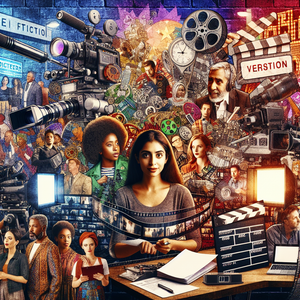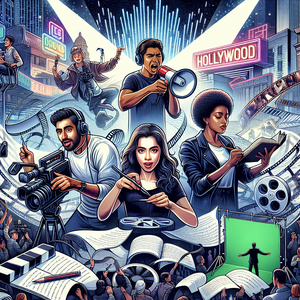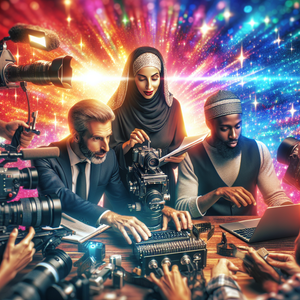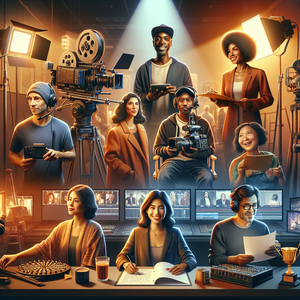
Exploring Career Opportunities in the Film Industry: A Comprehensive Guide
The film industry is an ever-evolving landscape that offers a myriad of career paths for those with a passion for visual storytelling. As the demand for films and digital content surges, the industry presents significant opportunities for job stability and growth.
Job Summaries:
Production Designer:
- Production Designers shape the visual essence of a film by designing sets that reflect its tone and style.
- They work closely with directors and cinematographers.
- They require a background in art or design.
- They need proficiency in design software.
- They must have effective budget management skills.
Film Editor:
- Film Editors piece together recorded footage to craft a coherent narrative.
- They must possess strong storytelling abilities and technical proficiency in editing software like Adobe Premiere Pro or Avid Media Composer.
- A degree in Film Studies can be beneficial, as editors significantly influence the film's pacing and emotional impact.
Sound Designer:
- Sound Designers create the auditory experience of a film.
- They are responsible for sound effects and background scores.
- An understanding of audio technology and software is crucial.
- A degree in sound engineering or music production is advantageous.
Cinematographer:
- Cinematographers, or Directors of Photography, capture a film's visual style through expert camera work and lighting.
- This role demands artistic vision and technical know-how.
- Often requiring a degree in cinematography and experience with various filming techniques.
Production Assistant (PA):
- PAs support various departments on set.
- Handling tasks from equipment management to crew assistance.
- This entry-level position typically does not require formal education.
- Making it ideal for newcomers eager to learn and grow in the industry.
Screenwriter:
- Screenwriters craft the scripts that form the backbone of films.
- They develop characters, dialogue, and story arcs.
- Strong writing skills and creativity are essential.
- A robust portfolio of scripts is important.
Art Director:
- Art Directors manage the visual elements of a film, including set design and props.
- This role requires leadership skills and a background in visual arts or design.
- Ensuring the film’s aesthetic aligns with the director's vision.
Make-Up Artist:
- Make-Up Artists are responsible for transforming actors into their characters using makeup and prosthetics.
- Certification from a cosmetology school and a keen eye for detail are often necessary.
Casting Director:
- Casting Directors identify and audition actors for roles.
- They work closely with directors to select the right talent.
- Strong communication skills are crucial.
- An understanding of acting is important.
- Formal education is not always required.
Location Manager:
- Location Managers scout and secure filming locations.
- They require excellent negotiation skills.
- Knowledge of local regulations is essential.
- A background in film production can be beneficial in this role.
Visual Effects (VFX) Artist:
- VFX Artists create CGI and visual effects that enhance the film.
- Proficiency in software like After Effects is essential.
- A strong understanding of animation principles is essential.
- A degree in Animation or Visual Effects is often required.
Assistant Director (AD):
- ADs coordinate the shooting schedule
- Manage the cast and crew on set
- Ensure productions run smoothly
- Strong organizational skills are vital
- Strong communication skills are vital
Film Producer:
- Film Producers oversee the production process from development to distribution.
- They require strong leadership and financial skills.
- A degree in Film Production or Business is advantageous.
Costume Designer:
- Costume Designers craft wardrobes that enhance character portrayal and contribute to the film's setting.
- Creativity and attention to detail are essential.
- Often requiring a degree in Fashion or Costume Design.
Grip:
- Grips handle equipment setup and maintenance.
- Playing a vital role in supporting camera and lighting operations.
- This physically demanding role benefits from technical skills and knowledge of film gear.
Storyboard Artist:
- Storyboard Artists visualize scenes to assist directors in planning.
- Artistic skills and an understanding of film language are critical.
- A degree in Animation or Fine Arts is advantageous.
Production Coordinator:
- Production Coordinators manage logistics, including scheduling and budgeting.
- Strong organizational skills are crucial.
- A background in film production is important.
Foley Artist:
- Foley Artists create sound effects that enhance a film’s audio experience.
- Creativity and sound design knowledge are essential.
- Formal education may not be required, but experience is crucial.
Line Producer:
- Line Producers oversee budgets and daily operations
- Require strong financial and organizational skills
- A degree in Film Production or Business is often helpful
Digital Imaging Technician (DIT):
- DITs manage the digital workflow of a film
- Ensuring visual quality through data management and color grading
- Technical expertise in software like DaVinci Resolve is essential.
Marketing and Distribution Coordinator:
- These professionals promote films and manage distribution.
- They require strong communication skills and an understanding of market trends.
- A background in marketing or business can be beneficial.
Each of these diverse roles exemplifies the extensive career opportunities within the film industry, catering to various interests and skill sets. By understanding the responsibilities and relevance of each position, individuals can better navigate their career paths in this vibrant sector.
Explore More Jobs

